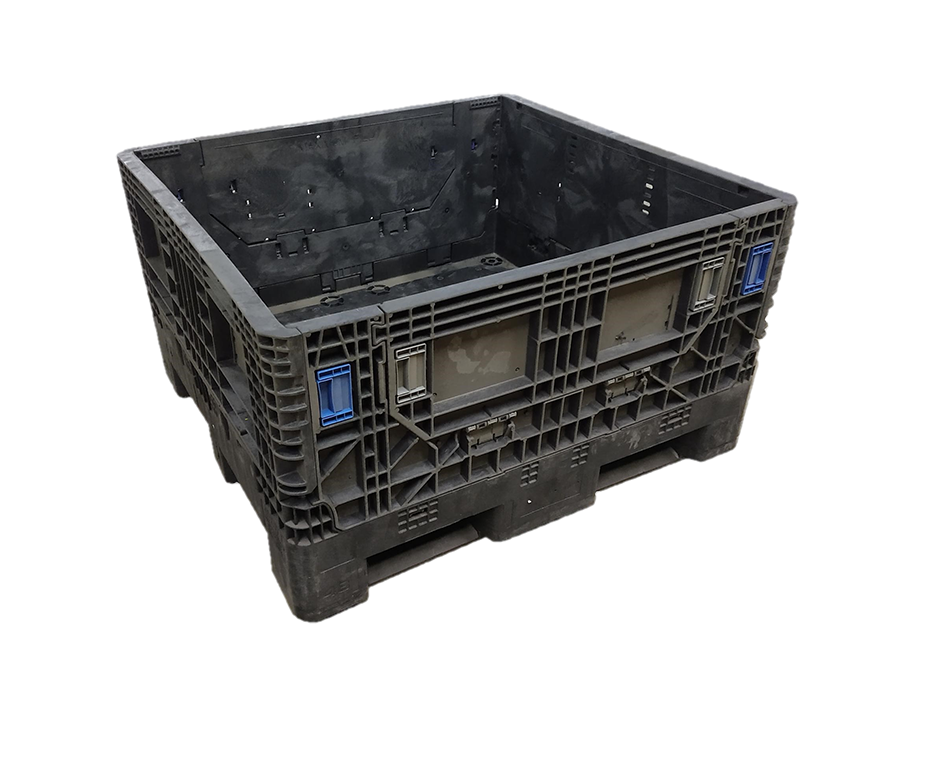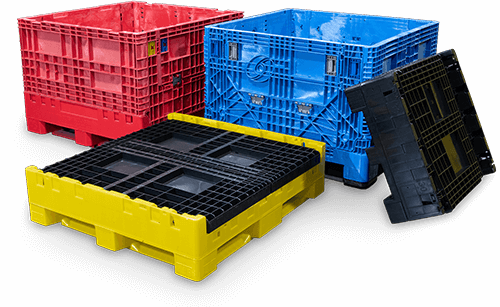The ultimate guide to used bulk containers for transporting goods safely
Wiki Article
Why Bulk Containers Are Important for Sustainable and Cost-Effective Transport
Mass containers play an essential duty in modern-day logistics. They assist in the effective movement of big quantities of goods, thereby enhancing transportation procedures. This technique not just minimizes prices however additionally reduces environmental impact through reduced exhausts and waste generation. As industries seek even more lasting practices, the fostering of bulk containers is becoming increasingly substantial. What ramifications does this shift hold for future logistics and supply chain management?
The Advantages of Making Use Of Mass Containers in Logistics
Bulk containers transform logistics by improving effectiveness and sustainability. These containers permit the transport of huge amounts of products in a solitary journey, significantly minimizing the variety of trips needed. This not just streamlines operations yet also reduces labor expenses connected with handling, filling, and unloading. In addition, bulk containers are developed to maximize area application within transport vehicles, making sure that even more products can be shipped all at once.The standardization of bulk containers likewise simplifies the logistics process. With uniform measurements, they can be quickly piled and saved, leading to boosted warehouse monitoring. Additionally, bulk containers commonly include long lasting materials that protect materials from damage during transit, consequently lowering product loss and enhancing overall dependability. As a result, businesses can experience enhanced supply chain efficiency, ultimately bring about increased success and consumer satisfaction. This mix of variables makes bulk containers a critical asset in modern-day logistics.
Ecological Effect: Reducing Waste and Carbon Footprint
As sectors progressively focus on sustainability, the fostering of mass containers has become a crucial technique for reducing waste and reducing carbon footprints. These containers minimize the usage of packaging products, such as boxes and plastic, thus especially decreasing total waste generation. By settling shipments, mass containers enhance transportation performance, enabling more products to be transferred per journey. This reduction in journeys straight associates with lower greenhouse gas emissions, adding to a smaller sized carbon footprint.Mass containers can often be reused or reused, further minimizing environmental impact. The durability of these containers assurances they can hold up against multiple transport cycles, minimizing the need for single-use options. used collapsible bulk containers. By improving logistics and promoting effective resource use, bulk containers not just sustain sustainable methods however likewise motivate sectors to align with worldwide ecological goals. Ultimately, their implementation shows a commitment to environmental stewardship and liable source administration
Price Financial Savings: How Bulk Containers Lower Transportation Costs
While many companies seek methods to boost their lower line, using mass containers presents a significant opportunity for lowering transport expenditures. Bulk containers make best use of the volume of goods transferred, permitting services to deliver bigger amounts at the same time. This performance lowers the variety of trips called for, straight decreasing fuel prices and minimizing labor expenses connected with loading and unloading.In addition, mass containers often include streamlined layouts that enhance area utilization within transportation cars. This suggests fewer vacant areas, leading to a lot more reliable use of readily available capacity. Furthermore, the toughness of bulk containers can lower the risk of item damage during transit, lowering losses and making certain that even more items get here intact.
Enhancing Supply Chain Effectiveness With Mass Storage Space Solutions
Mass storage options play a necessary duty in enhancing supply chain effectiveness by maximizing inventory administration. By consolidating products right into fewer, larger containers, organizations can considerably lower dealing with prices related to regular transfers and handling. This streamlined technique enables better tracking and monitoring of inventory, inevitably resulting in boosted functional performance.Structured Supply Management
Reliable inventory management is essential for enhancing supply chain procedures, especially when organizations adopt bulk storage remedies. These services enable services to keep greater supply degrees while minimizing the frequency of replenishment. By settling products into mass containers, companies can enhance their supply procedures, decreasing the complexity connected with tracking several smaller sized packages. This technique assists in precise stock counts and improves projecting precision, enabling for more informed decision-making. In enhancement, mass storage space options streamline storage facility organization, making it much easier to find and access products when required. Because of this, organizations can achieve a much more efficient supply turn over rate, eventually improving overall supply chain efficiency and lowering the probability of stockouts or overstock circumstances.
Reduced Handling Prices
The implementation of bulk storage space solutions not only enhances supply administration yet also substantially lowers dealing with expenses throughout the supply chain. By consolidating materials right into bulk containers, business minimize the requirement for constant handling and transfer between various storage space and transportation devices. This technique reduces labor expenses related to loading, unloading, and moving smaller plans. Furthermore, bulk storage space lowers the regularity of deliveries, bring about lower transport costs and lowered fuel intake. As a result, organizations can maximize their logistics operations, allowing for a more reliable appropriation of sources. Ultimately, decreased taking care of prices add to enhanced overall supply chain effectiveness, promoting an atmosphere read this post here that supports both sustainability and financial viability.
Flexibility of Bulk Containers Across Numerous Industries
Lots of industries have distinctive needs for transport and storage space, bulk containers have emerged as a versatile option that fulfills a broad variety of demands. These containers, varying from large containers to specialized tanks, can fit varied products, including liquids, powders, and granules. In the agricultural market, mass containers promote the transportation of fertilizers and grains, while the food and beverage industry utilizes them for components and completed items. The chemical sector relies upon mass containers for securely moving unsafe materials, ensuring conformity with safety regulations. Additionally, construction firms benefit from mass containers for transferring aggregates and other materials. Their adaptability includes various settings of transport, consisting of ships, trucks, and trains, enhancing logistical performance. This versatility not only streamlines operations across different fields however additionally promotes sustainability by decreasing product packaging waste and optimizing area en route. As a result, mass containers play an essential duty in contemporary supply chain administration.Future Patterns wholesale Container Usage and Sustainability
The future of bulk container use is significantly formed by innovative products advancement that enhances sustainability. Additionally, automation in logistics promises to simplify operations, lowering waste and enhancing efficiency. Welcoming circular economy techniques will even this link more revolutionize just how bulk containers are developed, made use of, and recycled, promoting a more lasting transportation landscape.Cutting-edge Materials Advancement
As industries progressively focus on sustainability, ingenious products advancement wholesale containers emerges as a considerable consider enhancing environment-friendly transportation options. Makers and researchers are exploring biodegradable plastics, recycled composites, and light-weight metals to decrease ecological impact. These products not just lessen waste but additionally improve fuel effectiveness by lowering the overall weight of containers. Furthermore, developments in clever materials, which can adjust to differing problems, enhance the durability and performance of Continue mass containers. The assimilation of these innovative materials lines up with circular economic situation concepts, promoting reuse and recycling. As the demand for lasting methods expands, the growth of such products will certainly play an essential role in shaping the future of bulk container usage in logistics and transportation.Automation in Logistics
Substantial innovations in automation are positioned to change logistics and the utilization of bulk containers, enhancing sustainability in transportation. Automated systems, including drones and independent vehicles, are simplifying the activity of mass containers, lowering the reliance on standard fuel-powered transportation. These innovations enhance transmitting and packing processes, enhancing and lessening empty miles fuel efficiency. In addition, automated supply administration systems enhance monitoring and surveillance of bulk containers, making sure much better resource allocation and reduced waste. The assimilation of the Web of Things (IoT) allows real-time information evaluation, allowing proactive decision-making that straightens with sustainability objectives. As automation proceeds to progress, it is expected to drive further developments in bulk container use, ultimately sustaining more sustainable logistics practices and reducing the ecological influence of transport.Circular Economic Situation Practices
Innovations in automation are setting the phase for a much more integrated technique to circular economic situation techniques in the domain name of mass container use. As markets increasingly welcome sustainability, bulk containers are being designed for durability and reusability. This change not only decreases waste however also boosts resource efficiency. Firms are embracing strategies such as closed-loop systems, where utilized containers are collected, refurbished, and reestablished right into the supply chain. Additionally, wise modern technologies track container life cycles, facilitating much better monitoring and reducing environmental effect. The collaboration between suppliers, logistics carriers, and end-users is vital in developing standards for sustainable container usage. used collapsible bulk containers. Future patterns indicate an expanding focus on products that are eco-friendly and recyclable, more reinforcing the circular economic climate's principles wholesale transport
Often Asked Questions
What Products Are Bulk Containers Generally Made From?
Mass containers are commonly built from resilient materials such as high-density polyethylene, light weight aluminum, steel, and cardboard. These materials give convenience, security, and toughness, making them suitable for moving various products in various markets successfully.Just how Do I Pick the Right Dimension Bulk Container?
Selecting the appropriate size mass container entails examining the volume of products to be moved, taking into consideration dealing with devices compatibility, and assessing storage space requirements. Proper size warranties efficiency in transportation and lessens waste throughout delivery.Are Mass Containers Reusable or Recyclable?
Mass containers are frequently recyclable, created for numerous journeys, enhancing sustainability. Numerous can likewise be recycled, depending on the materials utilized. Selecting recyclable alternatives additionally sustains ecological objectives and minimizes waste in transport techniques.What Safety And Security Rules Apply to Bulk Container Transportation?
Safety policies for mass container transportation consist of compliance with the Department of Transport standards, appropriate labeling of dangerous products, architectural honesty analyses, and adherence to weight restrictions to assure secure handling and stop mishaps during transit.Just How Can Businesses Transition to Making Use Of Mass Containers Successfully?
Businesses can change to bulk containers by assessing current logistics, educating team on handling, purchasing appropriate tools, enhancing inventory monitoring, and working together with providers to guarantee compatibility and performance throughout the supply chain.
As markets increasingly focus on sustainability, the fostering of bulk containers has actually arised as an essential strategy for reducing waste and decreasing carbon footprints. By settling materials right into bulk containers, firms can streamline their inventory procedures, reducing the intricacy linked with tracking multiple smaller packages. As markets significantly focus on sustainability, innovative materials advancement in bulk containers arises as a substantial variable in enhancing environment-friendly transport remedies. Automated systems, including drones and independent lorries, are improving the motion of mass containers, decreasing the reliance on typical fuel-powered transportation. In addition, automated stock management systems enhance tracking and monitoring of mass containers, guaranteeing better resource allotment and reduced waste.
Report this wiki page